|
|
|
Sort Order |
|
|
|
Items / Page
|
|
|
|
|
|
|
| Srl | Item |
| 1 |
ID:
121554


|
|
|
|
|
| Publication |
2013.
|
| Summary/Abstract |
In December 2006, Felipe Calderón took over as Mexico's new president and made a bold decision to directly confront the drug trafficking organizations that had steadily gained power over the course of his predecessors' terms in office. He started by sending troops into his home state of Michoacán, and over the next six years Mexico's government succeeded in pushing drug-ferrying planes off its airstrips and into airfields in Guatemala and Honduras. Over the course of "Calderón's War" Mexican soldiers captured and killed dozens of high profile cartel leaders. But after more than half a decade of continuous anti-cartel operations, many of the traditional strongholds of the country's drug trafficking organizations have experienced a worrisome deterioration in security. For instance, in the state of Guerrero, as cartel leaders such as the Beltran Leyva brothers and La Barbie were taken down, a destabilizing sequence of inter-cartel competition has led to a string of disturbing violent incidents as well as complaints about robbery and extortion. Over the course of Calderón's presidency it became clear that without complementary improvements in local policing efforts, the anti-cartel strategy would not be able to bring Mexico the long-term security and stability that citizens demand. Fighting the drug cartels is not enough. Effective security policy requires the police to help protect ordinary citizens from "unorganized" crimes such as theft, carjacking, and extortion.
|
|
|
|
|
|
|
|
|
|
|
|
|
|
|
|
| 2 |
ID:
121547
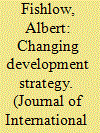

|
|
|
|
|
| Publication |
2013.
|
| Summary/Abstract |
Latin America experienced high rates of growth in the first decade of the twenty-first century. Will the region-increasingly split into Atlantic and Pacific countries with different policies-be able to continue this pace into the future? That will depend upon high rates of investment, regulatory stability, and openness to technological advancement to sustain gains in productivity and permit continued improvements in income distribution.
|
|
|
|
|
|
|
|
|
|
|
|
|
|
|
|
| 3 |
ID:
121552


|
|
|
|
|
| Publication |
2013.
|
| Summary/Abstract |
Mexico has undergone major changes over the past two decades, as its political system shifted from one dominated by a single official party to a highly competitive democracy, and its economy opened up dramatically to global competition. These changes have produced significant dislocations in Mexican society, including high out-migration and a spiral of drug-trafficking related violence. However, signs are that Mexico has now set the foundations for future success. Average income has grown significantly, violence is plateauing, and out-migration has dropped dramatically. There are potential pitfalls ahead, but the country's future looks far brighter today than it did a decade or two ago. If Mexico continues to grow and deepen its democratic process, these changes will have a profound effect on the United States, its neighbor to the north, as well.
|
|
|
|
|
|
|
|
|
|
|
|
|
|
|
|
| 4 |
ID:
121551
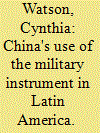

|
|
|
|
|
| Publication |
2013.
|
| Summary/Abstract |
China's involvement in Latin America has grown steadily over the past decade but there are a number of constraints on the role of the People's Liberation Army that prevents it from becoming the most important mechanism in expanding China's role in Latin America. This paper discusses those constraints and the methods China's military has used to engage with Latin America in the twenty-first century.
|
|
|
|
|
|
|
|
|
|
|
|
|
|
|
|
| 5 |
ID:
121553


|
|
|
|
|
| Publication |
2013.
|
| Summary/Abstract |
This article examines whether increasing global confidence in Brazil is well founded and, if so, what the implications might be for the global community. Landmark political, economic, and social achievements in contemporary Brazil are reviewed as well as the obstacles to raise human welfare to developed country standards within the next decade. The paper concludes that Brazil's growing influence in the global community is based on sound empirical evidence, a diverse economy, and an emerging society; it is not the result of passing good fortune. At the same time, the crushing legacy of past problems in areas that are vital to human welfare, including the education system and deficiencies in innovation and technological advance, continues to weigh heavily. Depending on how well its leadership deals with the legacy of the past, Brazil could become a more important actor in the international community over the next ten years. Brazil's rising use of "soft power" will contribute to addressing global issues such as clean forms of energy, sustainability, food security, and social inclusion. Even for this possibility alone, Brazil merits much close attention from a global community not yet fully aware of Brazil's transformation.
|
|
|
|
|
|
|
|
|
|
|
|
|
|
|
|
| 6 |
ID:
121546


|
|
|
|
|
| Publication |
2013.
|
| Summary/Abstract |
Latin American countries have succeeded in reducing poverty and income inequality over the last decade thanks in part to both economic growth and deliberate social policy measures. This study provides an overview of the available evidence of the changes in income distribution that have occurred in Latin America over the past two decades and their causes. While some attribute the improvements in distribution to changes in the international economy and the positive trend in the Latin American countries' terms of trade, others highlight the influence of changes in public policy. Both of these two sets of factors may have played an important role and may have interacted with one another in various ways.
|
|
|
|
|
|
|
|
|
|
|
|
|
|
|
|
| 7 |
ID:
121555


|
|
|
|
|
| Publication |
2013.
|
| Summary/Abstract |
Chile has a dire need as well as a vast potential to expand renewable energy production and the government has recently introduced regulatory reforms and incentives to facilitate their development. Nevertheless, the governance structure of the electricity sector poses significant barriers to the attainment of national energy aims. Actors from the state, private sector, as well as civil society must tackle the main constraints to provide a cohesive and targeted policy response to the issue.
|
|
|
|
|
|
|
|
|
|
|
|
|
|
|
|
| 8 |
ID:
121550
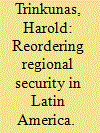

|
|
|
|
|
| Publication |
2013.
|
| Summary/Abstract |
In the wake of the Cold War, regional democratization and economic liberalization were supposed to usher in an opportunity to build a common hemispheric security agenda, designed to unite the United States and Latin America in collaboration against the "new" security threats posed by organized crime and violent nonstate actors. Two decades later, the threats remain much the same, yet the hemispheric security agenda has fragmented, replaced in part by projects designed to build specifically South American regional institutions. As some scholars predicted, heterogeneous threat perceptions across the region, differences over democratization, and tensions over the effects of free trade and market liberalization have confounded the effort to build a hemispheric security agenda. Yet the efforts by former President Hugo Chávez of Venezuela to radically transform the regional security order by building a Bolivarian alliance of states as an explicit counterweight to U.S. power have also fallen short. Instead, Brazil's ascent as a global economic power and the growing prosperity of the region as a whole has created an opportunity for Brazil to organize new mid-range political institutions, embodied in the Union of South American States (UNASUR), that exclude the United States yet pursue a consensual security agenda. This emerging regional order is designed by Brazil to secure its leadership in South America and allow it to choose when and where to involve the United States in managing regional crises. Yet, Brazil is finding that the very obstacles that confounded hemispheric security collaboration after the Cold War still endure in South America, limiting the effectiveness of the emerging regional security order.
|
|
|
|
|
|
|
|
|
|
|
|
|
|
|
|
| 9 |
ID:
121548
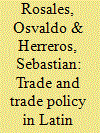

|
|
|
|
|
| Publication |
2013.
|
| Summary/Abstract |
This article presents a brief characterization of Latin America and the Caribbean's foreign trade, as well as its trade integration efforts. The first section examines the region's recent trade performance in terms of share in world trade, trade openness, main partners, most dynamic sectors, and export concentration. Particular emphasis is placed on the dynamics of the region's foreign trade in the past decade, including the growing importance of trade with China and its implications. The second section focuses on the recent evolution of intra-regional trade and of regional economic integration initiatives. The third section deals with trade negotiations with extra-regional partners. The fourth and final section outlines some policy challenges the region faces to increase the contribution of trade to its development prospects.
|
|
|
|
|
|
|
|
|
|
|
|
|
|
|
|
| 10 |
ID:
121549
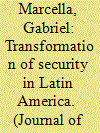

|
|
|
|
|
| Publication |
2013.
|
| Summary/Abstract |
Since the end of the Cold War, there has been a transformation of security in Latin America. Latin American countries have been moving toward the concepts of multidimensional security and security of the individual and society, and away from the classical understanding of the security dilemma posed by an external threat to the state. Illegal narcotics, the proliferation of guns, and other transnational threats, combined with undergoverned space and the weak state syndrome, generated an extraordinary crime wave, which gives the region the highest murder rate in the world. Moreover, crime imposes a heavy cost on economic growth and democratic governance. This insecurity crosses international borders, and the institutions of public security-police, military, and judicial systems-are hard pressed to meet the challenge. The privatization of security is a symptom of the problem and a potential source of abuse. The United States shares responsibility for the violence due to U.S. demand for illegal drugs and the fact that it is a supplier of arms to Latin America. At the same time, there is a growing consensus in support of common action, as evidenced by the international coalition that is operating under Operation Martillo-the antinarcotics effort in the Caribbean and Central America. Moreover, a number of Latin American countries contribute to international peace operations. Accordingly, the new strategic consensus among Latin American countries should be a cause for common action.
|
|
|
|
|
|
|
|
|
|
|
|
|
|
|
|
|
|
|
|
|